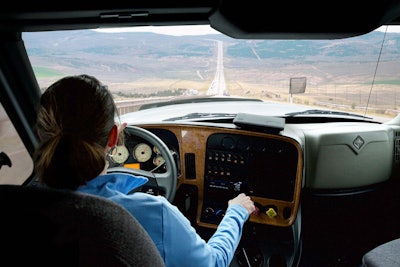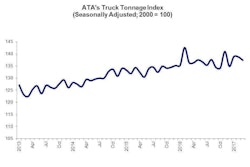 Photo courtesy of Vnomics
Photo courtesy of VnomicsStay Metrics, providers of an evidence-based driver engagement, research, and analytics platform that enables motor carriers to retain more of their best drivers, announces the results of a study on the turnover predictors for women drivers.
According to the Department of Labor, women comprise 43 percent of the total full-time workforce in the United States, but research shows only six percent of the truck driver population is female.
As freight volumes continue to grow and baby boomers retire, the trucking industry must recruit and retain more women drivers to keep up with labor demands.
Stay Metrics administers an annual driver survey on behalf of motor carrier clients and monitors whether drivers leave or stay with the carriers. The researchers analyzed the Stay Metrics Database, including annual survey responses from 12,502 drivers from 78 different carriers. Approximately 9 percent (1,122) of the respondents were women drivers.
Stay Metrics applied its latest predictive driver turnover model to identify correlations between areas of driver dissatisfaction or satisfaction as the case may be, with the known actions of drivers leaving or staying with their carriers.
“We consistently find that women drivers expect to be paid the same, to have equal opportunities, and to be treated with the same level of respect for doing the same job as male drivers,” said Tim Hindes, chief executive officer of Stay Metrics. “This study offers new insights into the relationship between women’s experiences and their propensity to leave a carrier.”
The model identified these 14 turnover predictors for women drivers, which are listed in descending order of relevance. (Those common to the top predictors for male drivers are in italics.)
Dissatisfaction with the tractor topped the list for women drivers. Concerns about the maintenance department and maintenance frequency were also strong predictors, suggesting a high value that women place on working equipment and avoiding breakdowns.
- Dissatisfaction with tractor
- Dissatisfaction with compensation for deadhead miles
- Dissatisfaction with hours worked
- Inadequate preparation during orientation for driving at this carrier
- Lack of respect at carrier’s facilities
- Dissatisfaction with Maintenance Department
- My work experiences match the expectations I had when I signed up for this job
- Dissatisfaction with frequency of maintenance done on equipment
- Dissatisfaction with dispatcher
- Dissatisfaction with pay
- Not getting enough miles
- Dissatisfaction with the respect my carrier shows me
- Work is not steady enough
- Desire to switch my dispatcher
Hindes observed, “Dissatisfaction with these 14 items are associated with turnover. Conversely, women drivers who have better experiences in these areas are more likely to stay with their carriers.”
“The findings show areas that carriers could improve — or do a better job of promoting — to recruit and retain more women drivers,” Hindes continued.
Interestingly, the study suggests that dissatisfaction with dispatchers is less important to women drivers than to men drivers. Just two of the top turnover predictors for women correspond with dispatcher relations, whereas for men dispatchers account for seven predictors.

“When applied to individual carrier data, our predictive models deliver important insights on the controllable causes of turnover that are specific to each company,” he continued.
Hindes presented some of the results of this study at the Truckload Carriers Association Annual Conference, March 26-29, in Nashville, Tenn., during a panel organized by Women in Trucking (WIT). The panel was moderated by Ellen Voie, President and CEO of the WIT organization.
“If a carrier can prove that the use of technology and the spec’ing of the tractor are aimed at driver satisfaction as well as the person’s safety and comfort, then they’ll attract (and keep) more women as drivers,” commented Voie.
As for why women drivers seem to get along better with their dispatchers or fleet managers than male drivers, she offered an explanation.
“Women are more social and more focused on interaction. A woman will work hard to maintain the relationship with her dispatcher because it is very important to her. However, a bad relationship will send a female driver to another carrier as well,” she said.



![Pottle’s truck[1]](https://img.ccjdigital.com/files/base/randallreilly/all/image/2013/12/ccj.Pottles-truck1.png?auto=format%2Ccompress&fit=crop&h=167&q=70&w=250)








